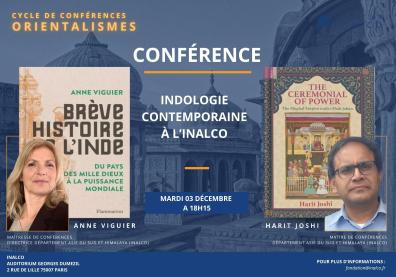Contemporary Indology at Inalco (1)

A brief history of India - from land of a thousand gods to world power
"Seen from afar, India is a land of legends that has fascinated travelers: the land of fakirs, fighting elephants and snake charmers has seen the birth of wisdoms and philosophies galore, and the Indian Union is the only country in the world to have preserved the polytheism that once dominated the planet. But religion does not reign supreme. An acute taste for mathematics, wise management of religious diversity, active policies of positive discrimination, linguistic nationalism: India is constantly drawing on the past to reinvent itself and nurture the soft power it wants to exert in the world. Anne Viguier explores its long cultural and political history. Since 2014, India has been ruled by a strongman, Narendra Modi, who intends to unify a country aiming for superpower status. Will he be able to do so?"
Anne Viguier is a historian specializing in India. A lecturer at Inalco and member of the CESSMA laboratory, she is currently director of Inalco's South Asia and Himalayas department. She has co-edited several books including, Territoires, textes et savoirs au pays tamoul (Bulletin des Études indiennes, 2021), and the Encyclopédie des historiographies, Afriques, Amériques, Asies, vol. 1 (Presses de l'Inalco, 2020).
The Ceremonial of Power - The Mughal Empire under Shah Jahan
"The Ceremonial of Power studies the court ceremonial during the reign of the Mughal emperor Shah Jahan (1628-58) and its use as an indispensable tool in asserting imperial authority. It examines Shah Jahan's portrayal in contemporary and later historiography through an analysis of the writings of the court chroniclers, the colonial administrator-historians, and their Indian counterparts. The volume sheds light on different features of the emperor's personality that emerge from the official discourse as well as other significant aspects of his reign : Shah Jahan's passion for architecture and the layout of his court; the emperor's relationship with his courtiers and their daily interactions; Shah Jahan's religious views and their influence on court proceedings; the ceremonial nature of his diplomatic exchanges with the other major empires of the contemporary Islamic world; and finally, how Mughal court ceremonial was reappropriated in the following centuries, first by the successor states, and then by the British. "
Harit Joshi is a lecturer in the South Asian Himalayan Department at Inalco, where he teaches Hindi and the history of ancient and medieval India. A member of the CESSMA laboratory, he is co-author of Hindi de Poche (Assimil, 2012) and has co-edited Ville et fleuve en Asie du Sud: Regards Croisés (Presses de l'Inalco, 2014) and Jardins d'Orient: Entre usages sociaux, pratiques politiques, et mémoire du passé (Presses Universitaires de Valenciennes, 2023).